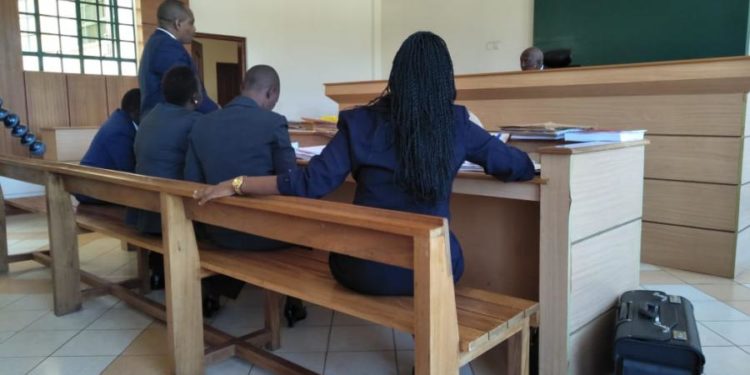By Susan Kendi
Kenya’s High Court has dismissed the bulk of a case in which petitioners alleged the government failed to protect them from police shootings during the violence that erupted after the December 2007 presidential election.
Judge Fred Ochieng determined that 12 out of the 15 petitioners who had filed a case before him at the High Court in Kisumu had failed to prove their case. He said they had failed to provide evidence to show police were involved in unlawful shootings or had shot them during the violence that shook Kenya between December 2007 and February 2008.
In his July 27 judgment, Judge Ochieng said he reached this conclusion, “because this is not a case in which all the Petitioners were together at one particular place, when the matters complained of took place. If the circumstances in which the incident took place were same for the Petitioners, the findings on the issue of liability would apply in uniform manner, for all the Petitioners”.
“But because the circumstances were different for each Petitioner, the Court was obliged to make specific findings based upon the evidence tendered by each Petitioner. Therefore, for all petitioners who tendered no evidence at the trial, I find that their respective claims have no factual foundation: the same are thus dismissed,” said Judge Ochieng.
The lawyer for the petitioners, Mbugua Mureithi, told Journalists for Justice he only got to know about the July 27 judgement in September.
“The first time for us to participate in the petition [since] last year, was in September. I informed the court that all these things have been happening behind our back … we have seen the judgement… we will make an application to seek leave for us to file a notice of appeal out of time,” said Mureithi.
The petitioners are 13 individuals and two civil society organisations: Citizens against Violence and the Independent Medico-Legal Unit. They first filed their petition in February 2013 in Nairobi. The case was later moved to the High Court in Kisumu. Among the things the petitioners were seeking were court orders to compel the government to effectively investigate unlawful police shootings during the post-election violence that occurred between December 2007 and February 2008.
This violence erupted after Mwai Kibaki was declared the winner of the presidential election that was held on December 27, 2007. The Commission of Inquiry into Post-Election Violence said in its report released in October 2008, that 1,133 people died in the violence out which 405 deaths were caused by gunshots wounds from police shootings.
The three petitioners Judge Ochieng found had been harmed by the actions of the police are Alice Atieno Ochieng, Hudson Bob Libabu and Tobias Wanga Odhiambo. The judge determined Odhiambo provided enough evidence to prove that it was the police that shot him.
“The police action was unlawful and brutal. It violated the 12th petitioner’s right to security of the person,” the judge said, referring to Odhiambo. He is number 12 on the list of petitioners. Judge Ochieng found that the police were responsible for failing to investigate and prosecute the perpetrator of the unlawful shooting of Odhiambo.
The Inspector General of Police is one of the respondents to the petition. The other respondents are the Attorney General, the Director of Public Prosecutions and the Independent Policing Oversight Authority.
In his summary of Odhiambo’s testimony, Judge Ochieng said Odhiambo was shot while crossing the road in the company of three other people. He sustained a gunshot wound on the lower part of his right leg. Four police officers armed with rifles appeared and accused one of their colleagues of injuring Odhiambo without any justification.
The judge said Odhiambo testified that one of the officers cut a piece of his shirt sleeve and tied it on his leg to stop the bleeding and they rushed him to hospital where he was admitted until February 2008. He was then transferred to Tenwek Mission Hospital, where his right leg was amputated below the knee because it was so badly infected and it could not be saved.
The other two petitioners Judge Ochieng found the government liable for the harm they suffered are Alice Atieno Ochieng and Hudson Bob Libabu.
In his summary of the testimony of Alice Atieno Ochieng, the judge said she was shot in Kisumu and produced a Kenya Police medical report form (P3 form) showing that she had reported the incident to the Kondele police station on May 19, 2008. The judge said she could not identify the person who shot her and hence failed to prove that it was a police officer who shot her. He said that Alice Atieno Ochieng testified that her landlord, Eliud Otieno, witnessed the shooting and told her it was a police officer who shot her. Judge Ochieng said Otieno did not testify and Alice Atieno Ochieng’s account could not be corroborated.
Judge Ochieng said that Hudson Bob Libabu testified that he reported the shooting of his daughter, Barbara Sereta Lumwaji, at the Central police station in Kisumu. The judge said when Libabu reported his daughter’s killing he was informed the police had already opened an inquest into her death.
The judge found that the Attorney General and the Inspector General of Police violated Alice Atieno Ochieng’s and Hudson Bob Libabu’s right “to information and effective remedy”.







